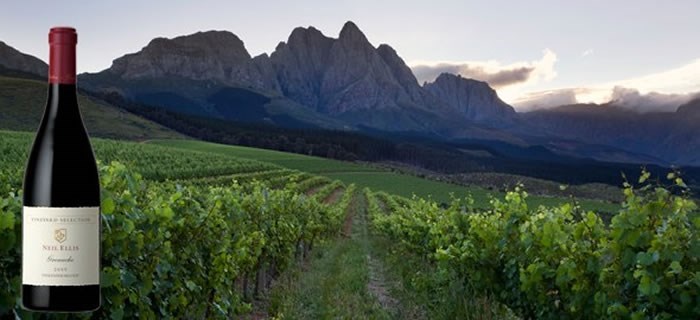Throughout the length and breadth of the South African wine world, Neil Ellis is at the top of the pile when it comes to naming respected industry players.
The elegant boldness of the name “Neil Ellis” on those clean, white labels says it. The focussed quality of the content inside every bottle, in every range exudes it.
During the stifled personal conversations of the wine world’s inner-circles, Neil’s name is usually used when talk turns to visionaries and pioneers, those rare individuals that did it their way. Made it happen, by doing instead of talking. You don’t have to hear the respect for Neil Ellis, you sense it.
His conversation is a lot like his precise, accurate wines. Not a word out of place. Less is more.
“Did I always want to get into wine? Not necessarily,” says Neil. We are sitting in the sun outside the spacious building of Neil Ellis Wines on the Helshoogte Road, catching a cool southerly breeze blowing over the Simonsberg. “What I did know, is that I was never going to work inside of a four-walled office.”
This he already knew at school. Parents living in Milnerton, Neil packed off to boarding school in Wellington. The one year of compulsory military service gave him time to think. And without any real signs of wine in his blood or impassioned belief in the life-affirming joy of the vineyard, he enrolled at Elsenburg Agriculture College to study winemaking and viticulture.
For a leading voice of South African wine, Neil is uncharacteristically matter-of-fact when it comes to his vocation. “I only really, and I mean really, got interested in wine when I began working at the KWV’s production facility in 1974,” he says. “This was the time of ‘white coat’ wine-making when the whole world was absolutely obsessed with science and technology in the cellar. And in South Africa we did it very well – why do you think we imported so many Germans to help us out, and why so many of our wine makers went to study there?”

The industry of that time, says Neil, thought precision wine-making was the way to go. “But in my second year at the KWV, I started asking questions about wine and all its facets. I wanted to know more, be more involved and had decided that wine was now my career.”
The break he got was to head-up the Groot Constantia cellar. “There I was closer to the link between vineyard and winery, which opened my eyes to the role of the vineyard,” he says. “The Weisser Riesling, Sauvignon Blanc and Cabernet Sauvignon wines we made were tremendously rewarding. And in the early 1980’s I was looking around at what was going on the South African industry, and where we were in international terms. It was not a happy space. Bureaucracy was stifling everything. Technology was overdone. I felt that if we were going go to another level, the only thing would be to truly get our feet in the vineyard.”
Neil looks like some-one about to say something that he is absolutely, totally 100% committed to: “A revolution will never happen in the cellar. In my early days, I saw South African wine needed a revolution, and the only place it was going to happen was in the vineyard.”
Like introducing new varieties. And knowing where the pieces of dirt lay in the Cape winelands that would provide the wine maker with the quality and character of fruit the style of wine warranted.
After leaving Groot Constantia, a stint at Zevenwacht followed where, besides creating a new breath of fresh air in the Zevenwacht brand, Neil was given the leeway to make wine under his own name for the first time.
This meant total control: sourcing his grapes from vineyards and sites he wanted, crushing volumes of fruit and doing vinification without anybody leaning over his shoulder; doing everything just the way he wanted so as to bottle a wine with his name on the label. “The decision to put my own name on the label, well, it meant I could not run away from the end product – I was responsible from beginning to end.
The first Neil Ellis wine was a Stellenbosch Cabernet Sauvignon. 1984. “And I suppose that’s where it…this I have around me now…all started. I had to leave Zevenwacht to concentrate on my own label.” You can’t serve two masters, especially if your name is Neil Ellis.
Click here to read the full article online.